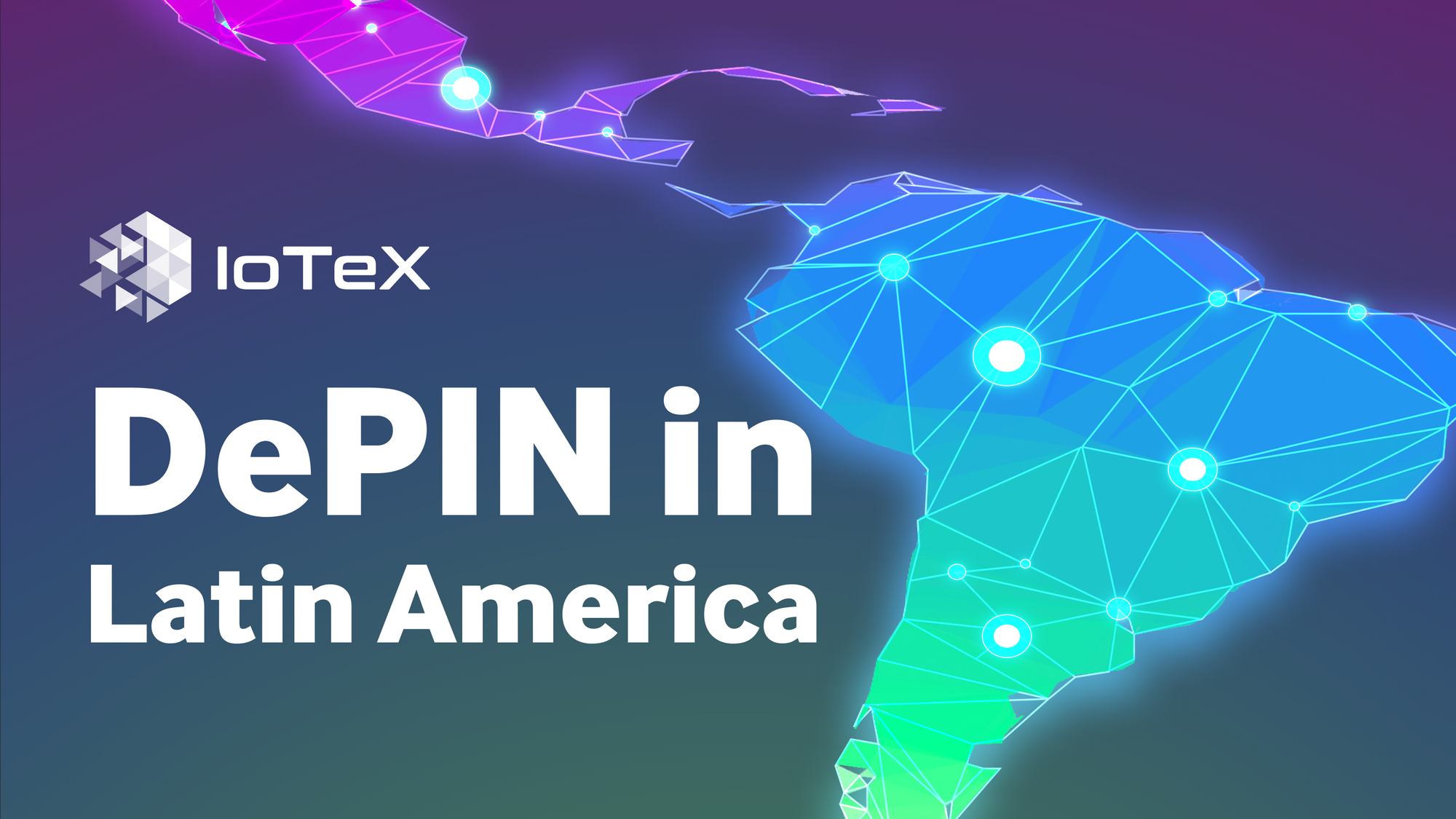DePIN Impact in Latin America: Introducing Blockchain to Physical Infrastructures
Explore the reasons why physical infrastructure has such a significant impact on the economy of Latin America and how decentralizing them with more DePIN solutions could be a major force of change.

Physical infrastructure plays a pivotal role in shaping and driving economic growth in countries across the world. This holds particularly true for Latin America, a region with vast potential and economies. Latin America's economic progress heavily depends on its physical infrastructure, encompassing transportation networks, energy systems, telecommunications, water supply, and more. Unfortunately, the centralization of these infrastructures has led to negative development of such. One big example of this is internet access. Because of the lack of development of roads and physical infrastructure to cover electricity and internet connectivity, access to it in rural areas in LATAM is higher than in many countries.
As seen in the following picture, internet connectivity is at most 81% in LATAM, whereas in more developed countries like the USA, Europe and Asia 80% is the lower limit.
In this article, we will explore the reasons why physical infrastructure has such a significant impact on the economy of Latin America and how decentralizing them with more DePIN solutions could be a major force of change. Latin America is an underdeveloped region, with vast resources but little physical infrastructure. Most countries have only a couple of big cities with a diversity of smaller towns where physical infrastructure is nowhere to be seen. Currently, governments control the majority of this development which complicates the access to basic services like electricity and internet. DePIN, however, could change this narrative.
For starters, it is important to understand what DePIN is.
“DePIN stands for Decentralized Physical Infrastructure Networks. It's a new way to build and maintain infrastructure in the physical world. This "infrastructure" can be anything from WiFi hotspots in wireless networks to solar-powered home batteries in energy networks.” – What is DePIN?
By taking away the government’s control over vital infrastructure and providing people incentives to build it themselves, a big jump in development might be seen in LATAM.
This digital revolution presents an opportunity for decentralization and connectivity in Latin America. Currently, trading of goods is done in an old-fashioned way where physical presence is vital. For example, selling merchandise has to be in person. Online marketplaces still fail to succeed here because of a lack of payment and delivery infrastructure. Here, an investment in expanding broadband internet access and improving telecommunications infrastructure, especially in rural and remote areas could make a difference. By bridging the digital divide, countries can empower small and medium-sized enterprises (SMEs) and entrepreneurs, enabling them to participate in e-commerce, access new markets, and expand their businesses. Also onboard people in remote areas to a digital type of transacting. Or even yet, just access basic educational resources. This inclusive approach to connectivity can lead to greater economic opportunities and regional development.
An example of this within the DePIN narrative is Wayru. Wayru is a decentralized internet network that allows anyone to set up a hotspot and earn rewards in cryptocurrency. This enhances connectivity within communities that normally don't have access to the internet given a lack of infrastructure and investment in such. In total, 32% of the Latin American and Caribbean population, that is 244 million people, have no internet access according to the Inter-American Development Bank. Bringing these communities into connection could substantially change the lifestyle, education, and progress of such. Wayru has joined forces with IoTeX by utilizing W3bstream to not only provide access to the internet in rural areas but reward any individual user that wants to operate a mobile hotspot to share connectivity within the community.
Boosting Productivity and Competitiveness
In addition, adequate physical infrastructure provides a solid foundation for businesses to operate efficiently. Reliable and well-maintained transportation networks reduce travel time, enable just-in-time delivery, and minimize disruptions, thus improving productivity.
One very common issue along LATAM is the lack of trust in transportation fleets. Many public transportation services have an outdated system with an auditor who is checking the routes every so often. This means an actual person standing in a bus stop writing down the times that the bus stops at this specific stop, making sure the bus is coming when it should. This presents an issue as auditors are easily corrupted by bus drivers to avoid making stops where not many people use the bus. These stops, however, are required by the local government to ensure public transportation coverage. By utilizing geo location from tamper proof devices, these problems can easily be solved to ensure access to transportation for all populations. A simple addition of a trusted device such as a pebble tracker in public transportation ensures that the bus drivers are taking the adequate routes. Also, In addition, utilizing DePIN capital to involve more parties in a decentralized manner can produce better routes in order to improve not only commercial fleet movement but also public transportation. Moreover, modern energy grids and access to reliable power supply are essential for industrial activities, encouraging innovation and attracting investments. Some projects like Uenergy promote solar panel energy grids by incorporating web3 investment, and tracking tools born from a DePIN narrative.
Unergy and Silta Finance joined forces to invest US$ 100 million in the creation of solar mini-farms, which will reduce CO2 emissions, as a commitment to the development of renewable energies for Colombia.The incentivized model of their DePIN infrastructure where solar farm operators gain rewards by managing them and the easy access to participate in the project through DeFi brought in a big amount of investment. Latin America faces a lack of sufficient financing to massively promote solar energy projects. So Uenergy utilized a DeFi model to bring in sufficient funds to develop such a project. They are building mini solar farms distributed across Colombia and Brazil to bring electricity to areas where regular energy infrastructure hasn’t reached. By reducing production costs, increasing investment through DeFi and enhancing competitiveness and openness by using a decentralized model, robust physical infrastructure becomes a catalyst for economic expansion in Latin America.
Promoting Regional Development
Investments in physical infrastructure and commerce have the potential to drive regional development and reduce regional disparities. Historically, certain regions within Latin America have experienced uneven growth, leading to social and economic inequalities. By applying a DePIN model to infrastructure projects in less-developed areas and increasing incentives for the buildout of infra in those areas will allow organizations to stimulate economic economic activities, create jobs, and improve living standards. Enhanced decentralized connectivity and access to essential services in these regions help foster inclusive growth and reduce poverty.
Attracting Foreign Direct Investment (FDI)
Foreign direct investment plays a vital role in Latin America's economic development. The average percent of GDP pertaining FDI in LATAM is 4% whereas in other more develop countries stands around 2%.The average percentage of GDP attributed to FDI in Latin America is 4%, while in other more developed countries it stands at around 2%. Investors often consider the quality of physical infrastructure when assessing potential investment destinations. Countries with well-developed infrastructure networks are perceived as less risky and more attractive for foreign businesses. Investments in transportation, logistics, and communication systems can improve a country's business environment, leading to increased FDI inflows, job creation, technology transfer, and knowledge spillovers. By including a DePIN narrative in the different structures, LATAM businesses can become more attractive to foreign investors. In addition, the financial tools that come within make it easier to invest in such projects. Traditional finance presents challenges when trying to invest in projects as various steps and procedures are needed. In general you have to create legal contracts, subscribe the business in some sort of public entity, utilize bigger allocations, etc. While with DeFi, a simple token or device purchase can open access to invest in such economies. Anyone globally can invest with any amount of money that funds a DeWi network in LATAM for example. Also the decentralized model established by DePIN projects is more censorship resistant, more open and less likely to facilitate corruption as the government’s involvement in deploying such networks is close to none.
In conclusion, physical infrastructure is a backbone for economic development in Latin America. Its impact is far-reaching, influencing trade, productivity, regional development, foreign investment, and human development. Projects and governments in the region need to prioritize decentralized infrastructure systems, focusing on both maintenance and new projects, to address existing gaps and unleash the full potential of their economies. By integrating a DePIN outlook to infrastructure, Latin America can foster sustainable growth, reduce inequalities, and improve the overall well-being of its population in the years to come.
If you are interested in DePIN you can learn more about the latest developments in the sector and compare projects by visiting DePINscan. DePINscan powered by W3bstream and IoTeX is designed to empower intelligent investors in the DePIN sector.
